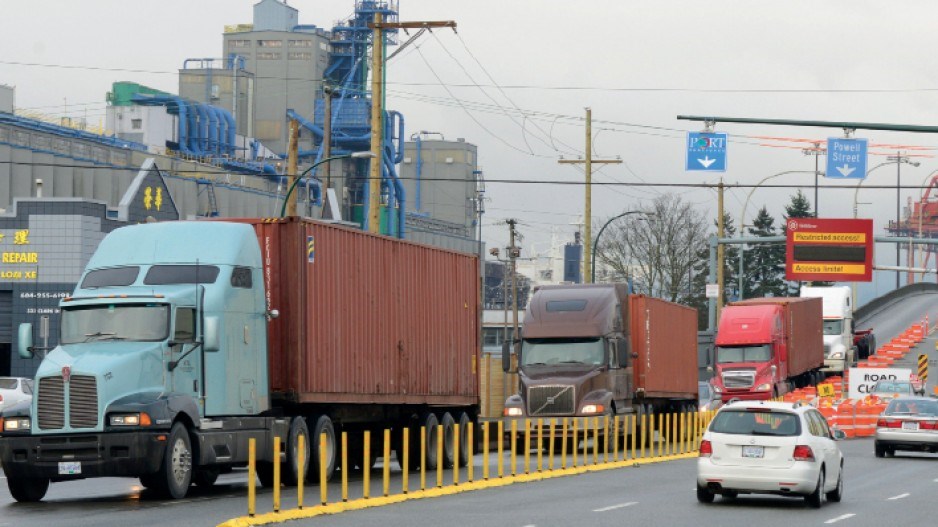Talks continued on March 14 towards a resolution of the trucking strike that has crippled Vancouver's port and caused layoffs in British Columbia's forestry sector.
Surinder Ghog, chief executive officer of Surrey-based Aspen Planers, told Business in Vancouver that approximately 10 workers at his company's reloading facility had been temporarily laid off because of the lack of work. The company's various veneer, plywood and cedar mills could be shuttered as early as next week if the strike continues.
Several pulp mills in Alberta would likely have to shut down next week if the strike continues, said James Gorman, president of the Council of Forest Industries. Most B.C. lumber mills could likely keep operating throughout next week, but not past that point.
Global Container Terminals, which operates Vancouver's Vanterm terminal as Terminal Systems Inc., announced March 14 it would issue force majeure - a clause in a contract that removes liability for unavoidable catastrophes - to its shipping line customers. It applies to import cargo for local delivery.
The company will remove force majeure if the labour dispute is resolved before March 17.
On March 13, the provincial and federal governments and Port Metro Vancouver presented a 14-point plan to the two groups of striking truckers: the non-unionized United Truckers Association, off the job since February 26, and Unifor-Vancouver Container Truckers Association, on strike since March 8.
Both groups - which represent a combined 1,400 truckers out of the port's normal complement of 2,000 - are concerned with low pay and long wait times at port terminals.
A spokesman for Unifor said talks were underway and that union leadership is eager to meet with the government to discuss what is missing in the plan.
The 14-point plan is based on interim recommendations from labour mediator Vince Ready. Federal transport minister Lisa Raitt appointed Ready to review the trucking rate and licensing system. Ready is the author of a previous deal that ended a 47-day port trucking strike in 2005. The issues at that time were also low pay and waiting times.
On March 13, Premier Christy Clark and transportation minister Todd Stone were critical of what they said was the federal government's tardy review and approval of the plan. Raitt had been focused on resolving a severe rail backlog affecting grain farmers in the prairies.
Through a cabinet order-in-council, Canadian National Railway (TSX:CPR) and Canadian Pacific Railway (TSX:CP) have now been ordered to move 5,500 cars of grain a week or face fines of $10,000.
"I understand that the grain crisis is important, but the significance of the grain industry compared to Canada's largest port being on its knees was quite frustrating," Stone said.
Raitt did approve the plan late March 13, and it is now in the hands of the truckers and the trucking companies.
"It's certainly not perfect, but it's going to fix a lot of problems at the port," Stone said of the 14-point plan.
Stone said that the order-in-council to ship grain could impact B.C.'s forestry and mining sectors, which have also struggled to get enough rail cars to ship their product.
"There are ore exporters like Teck [Resources], who are extremely concerned about how many cars are going to be available because of capacity being dedicated to grain," Stone said.
"Both major railways have suggested that increasing the capacity on the grain side is going to decrease capacity in the supply chain for the movement of other commodities, a lot of which will significantly impact British Columbia."
While 12 of the points in the proposed plan are under federal jurisdiction, Stone acknowledged that the province had room to improve in its role as auditor of the trucking rate and licensing system. Some observers of the port trucking system have said that rates and enforcement have slipped since the 2005 agreement was established.
Ready will deliver his final report to the federal government May 30.
@jenstden




